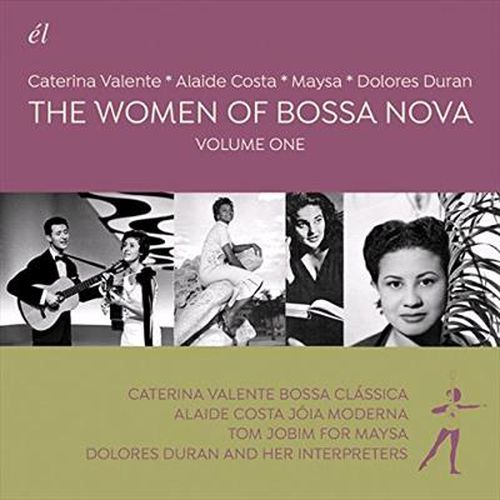Women Of Bossa Nova
Various Artists

Women Of Bossa Nova
Various Artists
With the advent of bossa nova, Caterina Valente was perhaps the first European popular artist with the curiosity to actually venture to Brazil. A student of Latin American music, she gained the respect of bossa's protagonists when, on her arrival in April 1961, she proclaimed (in Portuguese) her admiration for the work of Agostinho dos Santos and Maysa and that she believed Brazilian music to be the best in the world. Caterina then gave a tremendously successful show at the Teatro Record in São Paulo and appeared at the Copacabana Palace in Rio before returning home to spread the word. She fashioned a delightful album with Brazilian master-guitarist Luiz Bonfá, and proceeded, over the years and in a profusion of languages, to record superior interpretations of the bossa classics. Unlike some other European musicians who may have struggled to disseminate bossa's rhythms or comprehend its nuances, Caterina (possibly the most cosmopolitan musician on the planet) seemed at once to be on the right emotional wavelength. A suitably light touch in performance and a personal interest in Brazilian and Portuguese culture doubtless assisted her in meeting the demands of this gorgeously understated, elegant music. When in the 1970s she visited Brazil with a German documentary film crew, bossa nova, having reinvigorated both jazz and international pop music, had become a worldwide phenomenon. Such imperious Jobim compositions as ‘Corcovado’ and ‘One Note Samba’ (which Caterina had championed), ‘Chega de saudade’, ‘How Insensitive’, ‘Girl from Ipanema’ and ‘Wave’, were now the eternal masterpieces of the genre. João Gilberto first encountered Alaide Costa while she was recording an early 78 for RCA Victor. At once, He heard in her voice the subtle, modernist qualities he felt were required for the new style he was in the process of perfecting, the style that would be bossa nova. Arguably bossa nova's best kept secret, Alaide's early albums are remarkable, displaying a rich, complex potential that would, inexplicably, go largely unfulfilled. Still, her sensitive interpretations of ‘Chora ta tristeza’ (‘Cry Your Sadness’) by Oscar Castro- Neves and Luvercy Fiorini and ‘Sem Você’ (‘Without You’) by Jobim and Vinicius with the peerless Baden Powell on guitar, are indispensable examples of Brazilian music at its most temperate. Maysa, to quote Caetano Veloso, was 'a beautiful eighteen-year-old from São Paulo's high society who, with her wild green eyes and her smoky voice, was the overnight sensation of the bohemian set; she also wrote a few simple and exemplary songs of her own, all samba-cançãoes, none of them ever forgotten'. She is regarded as the greatest romantic singer in the history of MPB. The Édith Piaf of Brazil. It is said that Marlon Brando owned copies of all her records. Certainly her performances (presented here) of pre-bossa and early bossa selections from the Tom Jobim songbook are extraordinary in their drama and intensity. As a singer and songwriter, Dolores Duran worked mostly in the samba-canção style, writing songs that portrayed emotional torment and romantic suffering, but her repertoire extended to North American popular songs (Ella Fitzgerald attended a show in Rio and declared that Dolores' interpretation of ‘My Funny Valentine’ was the finest she had ever heard). Still, it is for the timeless quality her own impassioned compositions written either alone or with Jobim for which she is remembered. Her first co-composition with the young Antônio Carlos Jobim was created in 1955. ‘Se É por Falta de Adeus’ (‘If It's Because We Haven't Said Goodbye’) was recorded first by Doris Monteiro. The partnership also created the marvellous ‘Por causa de voce’ (‘Because of You’) and ‘Estrada do Sol’ (‘Road to the Sun’). Her biggest hit, ‘A noite do meu bem’ (‘My Sweetheart's Night’) was recorded after returning from a trip to the Soviet Union, via Paris, just days before she succumbed to a heart condition at the tragically early age of 29. Professional recognition of Dolores' facility as a composer came posthumously with Elis Regina, Caetano Veloso, Nara Leão, Gal Costa, Milton Nascimento, Tito Madi, Alaide Costa and Maysa among the artists who would record her songs. In 1960, the popular ballad singer, Lúcio Alves, created an entire album of Dolores compositions as a tribute and thirty-four years later Nana Caymmi did the same. In 1969, at the sessions for the second collaboration between Frank Sinatra and Tom Jobim, Sinatra sang a fine version of ‘Por causa de voce’ in an English translation by Ray Gilbert entitled ‘Don't Ever Go Away’.
This item is not currently in-stock. It can be ordered online and is expected to ship in approx 3 weeks
Our stock data is updated periodically, and availability may change throughout the day for in-demand items. Please call the relevant shop for the most current stock information. Prices are subject to change without notice.
Sign in or become a Readings Member to add this title to a wishlist.


